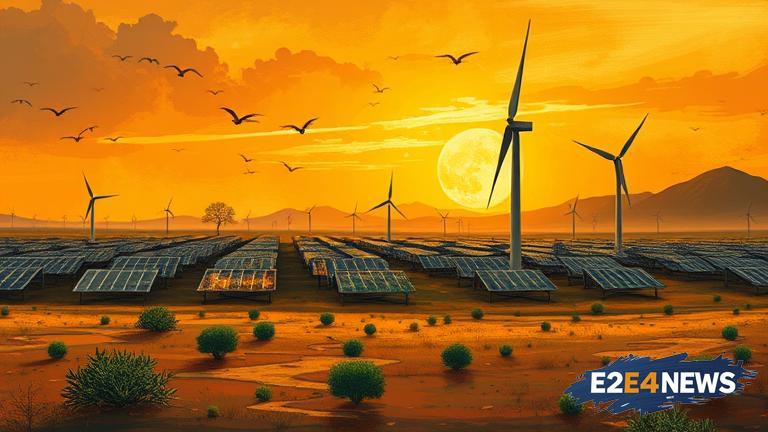The African continent is witnessing a significant shift towards renewable energy, driven by the need to address the pressing issues of energy access, climate change, and sustainable development. With a growing population and increasing economic activities, the demand for energy is on the rise, and renewable energy sources such as solar, wind, and hydroelectric power are becoming increasingly attractive. Many African countries are now investing heavily in renewable energy infrastructure, with a focus on solar and wind power. For instance, South Africa has set a target of generating 42% of its electricity from renewable sources by 2030, while Morocco aims to increase its renewable energy capacity to 52% by 2030. Egypt, on the other hand, has launched an ambitious plan to generate 20% of its electricity from renewable sources by 2022. The renewable energy revolution in Africa is not only driven by government initiatives but also by private sector investments. Companies such as Siemens Gamesa, Vestas, and Goldwind are investing heavily in the African renewable energy market, providing cutting-edge technology and expertise to support the development of renewable energy projects. The African Development Bank has also launched a number of initiatives to support the development of renewable energy in Africa, including the creation of a $500 million fund to support renewable energy projects. The benefits of renewable energy are numerous, including reduced greenhouse gas emissions, improved air quality, and enhanced energy security. Moreover, renewable energy can also create jobs and stimulate local economies, contributing to sustainable development and poverty reduction. However, despite the many benefits of renewable energy, there are still significant challenges to be addressed, including the high upfront costs of renewable energy technologies and the need for significant investment in infrastructure. Additionally, the lack of grid connectivity and energy storage infrastructure in many African countries can make it difficult to integrate renewable energy into the grid. Nevertheless, the future of renewable energy in Africa looks promising, with many countries making significant progress in developing their renewable energy sectors. For example, Kenya has made significant strides in developing its geothermal energy sector, while Ethiopia has launched an ambitious plan to develop its hydropower resources. The African Union has also launched a number of initiatives to support the development of renewable energy in Africa, including the creation of a continental renewable energy policy framework. Furthermore, international organizations such as the International Renewable Energy Agency (IRENA) and the United Nations Environment Programme (UNEP) are also providing support to African countries to develop their renewable energy sectors. In conclusion, the renewable energy revolution in Africa is gaining momentum, driven by government initiatives, private sector investments, and international support. As the continent continues to develop its renewable energy sector, it is likely that we will see significant reductions in greenhouse gas emissions, improved energy security, and enhanced sustainable development. With the right policies and investments in place, Africa can become a leader in the global renewable energy market, providing a clean and sustainable energy future for generations to come. The development of renewable energy in Africa is a complex and multifaceted issue, requiring the involvement of governments, private sector companies, and international organizations. It is essential that all stakeholders work together to address the challenges facing the development of renewable energy in Africa and to ensure that the benefits of renewable energy are shared equitably among all members of society. Ultimately, the success of the renewable energy revolution in Africa will depend on the ability of governments and private sector companies to work together to create a supportive policy environment and to invest in the infrastructure and technologies needed to support the development of renewable energy. By doing so, Africa can unlock the full potential of renewable energy and create a sustainable energy future for generations to come.





